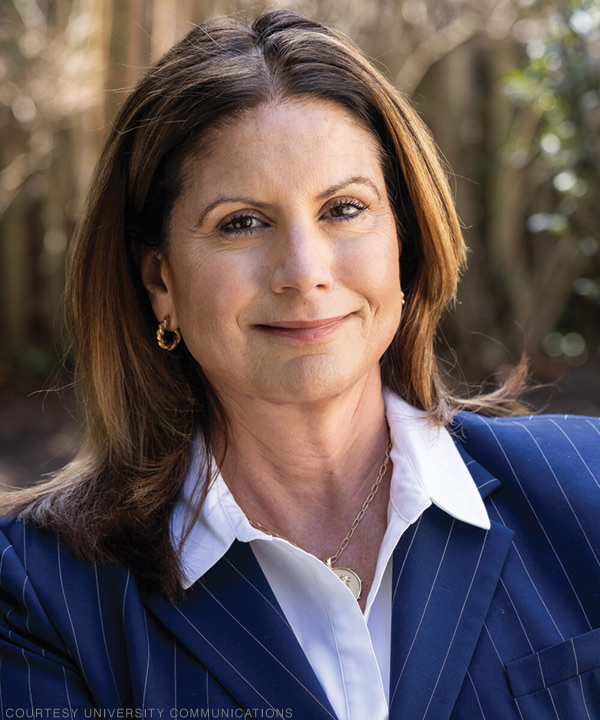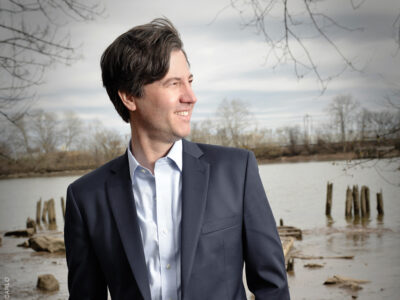
Penn Medicine’s chief advancement officer will lead the University’s overall development and alumni relations efforts.
Kathryn “Kate” Griffo—previously chief advancement officer for Penn Medicine—has been appointed the University’s vice president for development and alumni relations (DAR) as of April 1. She replaces James Husson, who left for a similar position at Harvard University after a bit more than two years at Penn [“Gazetteer,” Nov|Dec 2022].
Griffo, who has spent nearly two decades at Penn, raised more than $4 billion for Penn Medicine over the University’s Making History and Power of Penn fundraising campaigns, shepherding major naming opportunities—including the Perelman School of Medicine, Abramson Cancer Center, Smilow Center for Translational Research, Jordan Medical Education Center, Roberts Center for Proton Therapy and, most recently, the Clifton Center for Medical Breakthroughs—as well as advancing research across a broad range of fields and increasing financial aid for medical students.
“Kate Griffo is a highly respected leader whose strategic vision, dedication, and ability to build strong relationships have redounded to Penn Medicine’s and the University’s lasting benefit,” said Penn President J. Larry Jameson. “I am confident that in this new role, Kate will continue driving Penn’s fundraising success and deepen connections within our alumni and donor community.”
A first-generation college student, Griffo graduated from Dickinson College, where she had a work-study job as a prospect researcher—her first exposure to advancement work. After a brief stint as a substitute high school English teacher, she worked in development and alumni relations at Bryn Mawr College, which gave her “a chance to rotate through kind of every aspect of a development program,” she says. After seven years there, she joined Penn as a major gifts officer.
At Penn Medicine, she worked both with Arthur Rubenstein, who was dean of the medical school and vice president for the health system from 2001 to 2011, and with President Jameson throughout his tenure in the position. The chance to team up with Jameson again was a major attraction, she says. Another was “the opportunity to work more broadly with alumni across all the schools because they are a powerful force for good. They bring so much to Penn’s future, and I think it’s a really important time to tap into that network in new ways.”
Griffo says she is also looking forward to better understanding the “financial aid picture for students across the University” and to furthering the Quaker Commitment (see next article) by bringing “some creative strategies to support our alumni volunteers and Larry in raising money for financial aid”—an “evergreen” priority that is especially important now, with higher education under increased scrutiny and concerns rising over access and affordability. And she wants to look at ways to foster and recognize support for more cross-school collaborations “to tie some of those threads together in a way that really supports the entire University.”
One lesson from Penn’s successful past capital campaigns is the importance of establishing clear priorities. For now, those are coming from In Principle and Practice, the University’s strategic plan, which could form the basis for “mini campaigns” over Jameson’s announced tenure, which runs until June 30, 2027, in advance of “a potentially larger campaign effort in the future,” says Griffo. “So we want to be very intentional about putting building blocks in place that we can continue to build on with our alumni and our friends.”
Doubts over the extent and reliability of federal funding are putting even more pressure on universities—and development offices—to raise money. “I’m not sure that philanthropy can make up for the entire picture of what might be happening at the federal level,” Griffo says. “I think philanthropy is one piece of how we look at sources of revenue in the future,” including expanding partnerships with foundations and corporations as well as alumni supporters.
“This is a time when we see many of our alumni stepping forward to say, ‘How can I help?’ And that is always a good thing, because we need their advocacy as we make sure that Penn’s message remains true to our core values and our mission statement,” Griffo adds.
“I think Penn has a really important role to play in people’s lives, and that we need to keep our focus on making sure alumni know what’s happening here, have access to information and programming, and have the chance to gather together, because I think that is such a crucial part of the experience that people are looking for.” —JP




